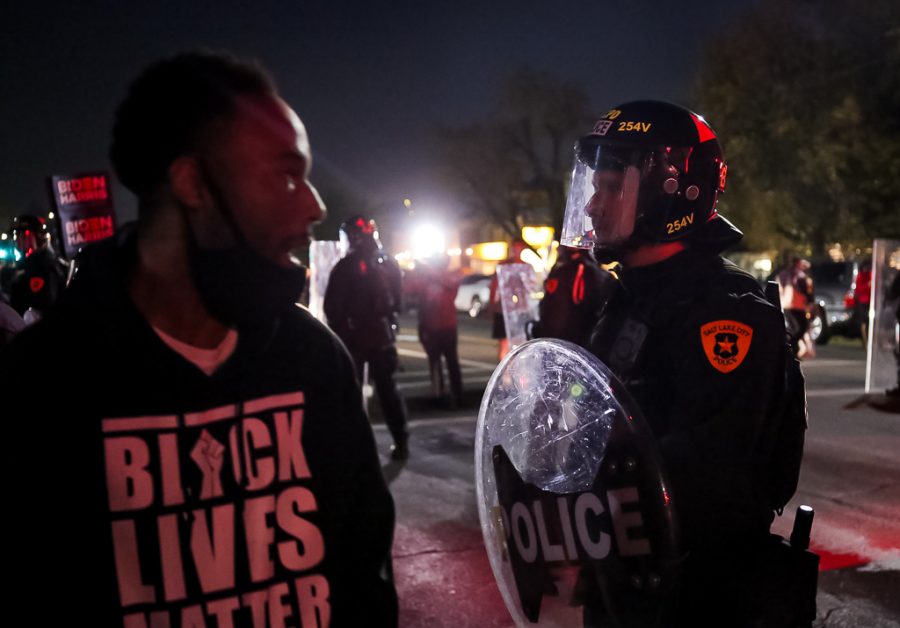Weglinski: No, Trump, Racial Sensitivity Training Is Not Racist
A protester speaks to police in the blockade at the intersection of 200 S and 1300 E in Salt Lake City, UT on October 7, 2020.(Photo by Jack Gambassi | The Daily Utah Chronicle)
October 31, 2020
President Trump called racial sensitivity training “racist” when asked to defend his recently issued cease order at the first presidential debate. The question referred to Trump’s new directive, which commanded the end of diversity, inclusion and equity programs among all federal government agencies.
The memo outlining the president’s instruction, sent out last month by the Office of Management and Budget, claimed that these training sessions were “divisive, anti-American propaganda.” Among the prohibited training topics were critical race theory and white privilege. However, diversity experts and businesses are concerned about Trump’s executive order. “It has politicized what we view as a nonpolitical approach to workplace inclusion. We believe inclusion is not a political issue. It’s a culture issue,” said Scott Hoesman, who runs a firm that provides racial sensitivity training to federal agencies.
Furthermore, this ban has been introduced in the aftermath of a summer of civil unrest in our country, which was catalyzed by George Floyd’s brutal murder by a police officer in May.
Trump’s actions clearly stem from white fragility and ignorance. Racial sensitivity training doesn’t teach Americans to “hate our country” as the president claimed. But rather, it educates people about their privilege and unconscious biases. As we work to address our nation’s ongoing social injustice, it’s essential that we continue to talk about race and how we can combat systemic oppression.
Systemic, or institutional, racism is “the systematic distribution of resources, power and opportunity in our society to the benefit of people who are white and the exclusion of people of color.” This type of racism differs from individual bias in that it is perpetuated through the enforcement of policies and practices that work to undermine minoritized groups, specifically Black people. Statistics make the reality of this discrimination abundantly clear. For example, Black people have been hit hardest by the COVID-19 pandemic and are over three times more likely than white people to be killed by police.
Even in the face of these hard facts, Trump continues to be ignorant and divisive. Most notable is his vehement opposition to critical race theory — “This is a Marxist doctrine holding that America is a wicked and racist nation,” Trump said. He even described the philosophy as “child abuse.” Whatever the Commander-in-Chief’s skewed ideas — which are often fueled by conservative propaganda — racial sensitivity training is actually meant to bring awareness to race issues and prevent discrimination in the workplace. In fact, inclusion training began during the Civil Rights Movement, and it hasn’t been limited to the United States. In Australia, diversity training is used to combat prejudice toward Aboriginal and Islander people, and similarly, South Africa has utilized this resource to help the nation “adjust to the removal of the Apartheid system.”
Businesses and organizations engage in racial sensitivity training to facilitate social change, whether that be through educating white people about their privilege or offering crash-courses on African American history. We can’t stop the discourse on race because of individuals who refuse to accept the true upbringing and reality of this country, no matter how much power they have.
Trump said that these training sessions were “teaching people that our country is a horrible place,” and “to hate our country.” In my experience, this statement is totally false. Similar to some of the material taught in diversity training, the Hidden History course I’m taking this semester focuses heavily on the Black experience in America — specifically the aspects of it that white supremacy has swept under the rug. Learning about the darker sides of the nation’s history — from Black codes to Jim Crow laws — has made me arguably more “American” in that I have become more cognizant of Black American struggles.
There’s a huge distinction between actively telling people to hate our country and simply teaching them about the reality of systemic racism in the United States’ past and present. If we feel threatened by the truth, then the problem lies within us, not the information.
The president couldn’t even condemn white supremacy on national television, so it’s no surprise that he would attempt to stop mechanisms that move us toward racial equality. If we want to fight against institutional racism and oppression, we need to continue the discussion of race in the workplace and in our everyday lives. Banning these vital conversations will just cause societal regression, not change for the better in our communities.









John Smith • Nov 25, 2020 at 12:06 am
Racial equity training needs to be balanced in teaching its awareness as to not strike a chord of hatred to a country that has made sacrificial strides to overcome racial discrimination thru it’s laws. The Naked Socialist outlines collectivist ideology and its intentions to use racism as the achillles heal in American society to advance a collective thought instead of getting the individual to own race equity training for himself. Another interesting book American History in Black and White, Setting the record straight shows how those who claim to fight racism mayvhave inherent ties to slavery